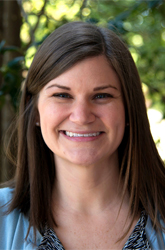 Audrey Gamble is an assistant professor in the Department of Crop, Soil, and Environmental Sciences at Auburn University and an Extension soil scientist for the Alabama Cooperative Extension System. She received a PhD in soil chemistry from the University of Delaware and an MS degree in agronomy and soils from Auburn University. Her research and Extension programming focuses on 1) providing soil fertility recommendations for major row crops, including cotton, corn, peanuts, and soybean, and 2) evaluating soil conservation practices (cover cropping and conservation tillage) in row crop production systems.
Audrey Gamble is an assistant professor in the Department of Crop, Soil, and Environmental Sciences at Auburn University and an Extension soil scientist for the Alabama Cooperative Extension System. She received a PhD in soil chemistry from the University of Delaware and an MS degree in agronomy and soils from Auburn University. Her research and Extension programming focuses on 1) providing soil fertility recommendations for major row crops, including cotton, corn, peanuts, and soybean, and 2) evaluating soil conservation practices (cover cropping and conservation tillage) in row crop production systems.
